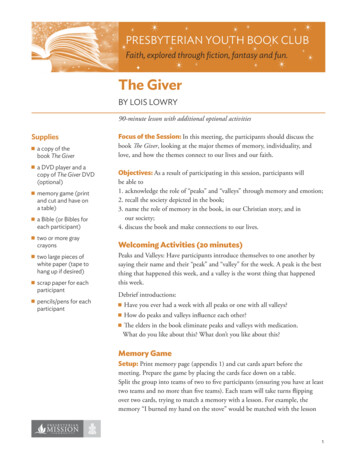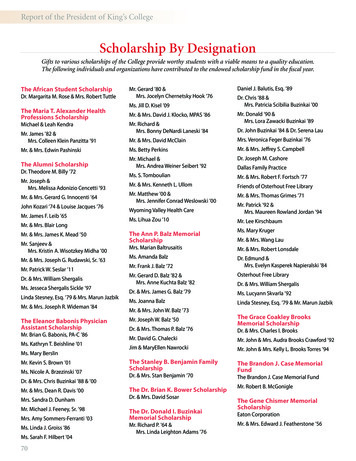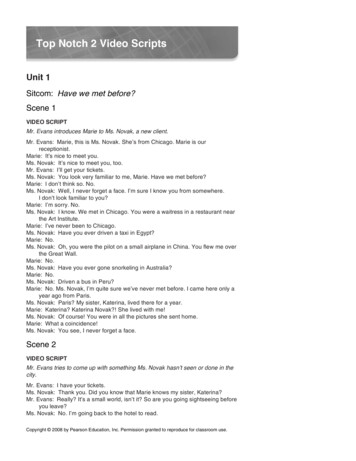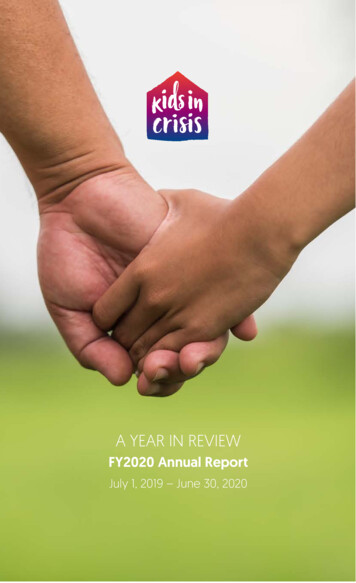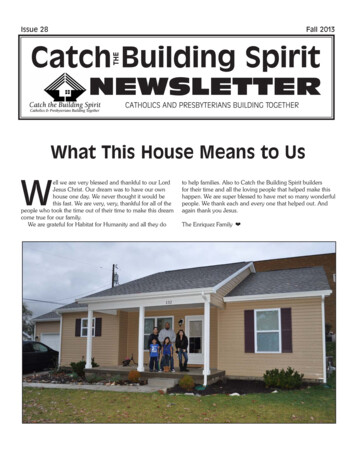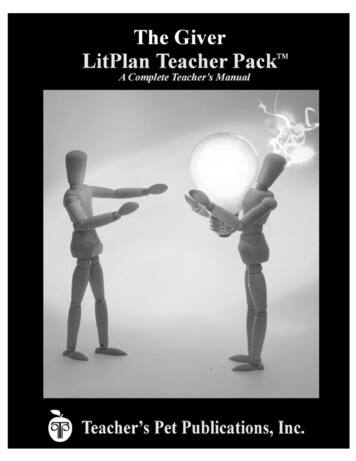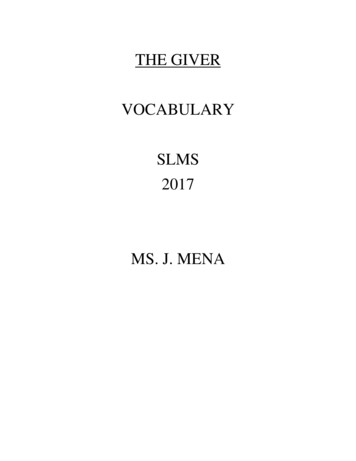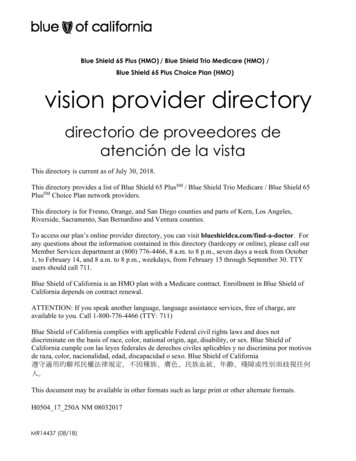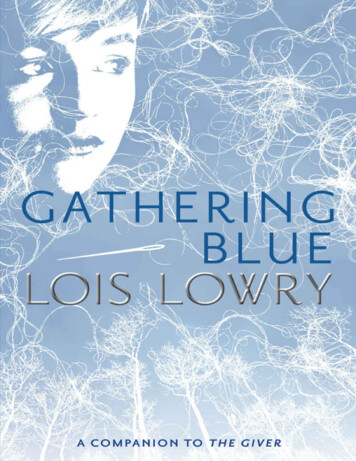
Transcription
Table of ContentsTitle PageTable of wenty-threeSample Chapter from MESSENGERBuy the BookThe Giver QuartetAbout the Author
Copyright 2000 by Lois LowryAll rights reserved. Published in the United States by Houghton Mifflin Books for Children, animprint of Houghton Mifflin Harcourt Publishing Company. Originally published in hardcover in theUnited States by Houghton Mifflin Books for Children, 2000.For information about permission to reproduce selections from this book, write to Permissions,Houghton Mifflin Harcourt Publishing Company, 215 Park Avenue South, New York, New York10003.www.hmhco.comThe Library of Congress has cataloged the print edition as follows:Lowry, Lois.Gathering Blue / by Lois Lowry.p cm.ISBN: 978-0-547-99568-7Summary: Lamed and suddenly orphaned, Kira is mysteriously removed from her squalid village tolive in the palatial Council Edifice, where she is expected to use her gifts as a weaver to do thebidding of the all-powerful Guardians.[1. Science fiction.] I. Title.PZ7.L9673 Gat 2000[Fic]—dc21 00-024359eISBN 978-0-547-34578-9v3.1214
One“Mother?”There was no reply. She hadn’t expected one. Her mother had been dead now for four days, andKira could tell that the last of the spirit was drifting away.“Mother.” She said it again, quietly, to whatever was leaving. She thought that she could feel itsleave-taking, the way one could feel a small whisper of breeze at night.Now she was all alone. Kira felt the aloneness, the uncertainty, and a great sadness.This had been her mother, the warm and vital woman whose name had been Katrina. Then after thebrief and unexpected sickness, it had become the body of Katrina, still containing the lingering spirit.After four sunsets and sunrises, the spirit, too, was gone. It was simply a body. Diggers would comeand sprinkle a layer of soil over the flesh, but even so it would be eaten by the clawing, hungrycreatures that came at night. Then the bones would scatter, rot, and crumble to become part of theearth.Kira wiped briefly at her eyes, which had filled suddenly with tears. She had loved her mother, andwould miss her terribly. But it was time for her to go. She wedged her walking stick in the softground, leaned on it, and pulled herself up.She looked around uncertainly. She was young still, and had not experienced death before, not inthe small two-person family that she and her mother had been. Of course she had seen others gothrough the rituals. She could see some of them in the vast foul-smelling Field of Leaving, huddledbeside the ones whose lingering spirits they tended. She knew that a woman named Helena was there,watching the spirit leave her infant, who had been born too soon. Helena had come to the Field onlythe day before. Infants did not require the four days of watching; the wisps of their spirits, barelyarrived, drifted away quickly. So Helena would return to the village and her family soon.As for Kira, she had no family, now. Nor any home. The cott she had shared with her mother hadbeen burned. This was always done after sickness. The small structure, the only home Kira had everknown, was gone. She had seen the smoke in the distance as she sat with the body. As she watched thespirit of her mother drift away, she had seen the cindered fragments of her childhood life whirl intothe sky as well.She felt a small shudder of fear. Fear was always a part of life for the people. Because of fear, theymade shelter and found food and grew things. For the same reason, weapons were stored, waiting.There was fear of cold, of sickness and hunger. There was fear of beasts.And fear propelled her now as she stood, leaning on her stick. She looked down a last time at thelifeless body that had once contained her mother, and considered where to go.Kira thought about rebuilding. If she could find help, though help was unlikely, it wouldn’t take longto build a cott, especially not this time of year, summer-start, when tree limbs were supple and mudwas thick and abundant beside the river. She had often watched others building, and Kira realized thatshe could probably construct some sort of shelter for herself. Its corners and chimney might not bestraight. The roof would be difficult because her bad leg made it almost impossible for her to climb.But she would find a way. Somehow she would build a cott. Then she would find a way to make alife.Her mother’s brother had been near her in the Field for two days, not guarding Katrina, his sister,but sitting silently beside the body of his own woman, the short-tempered Solora, and that of their
new infant who had been too young to have a name. They had nodded to each other, Kira and hermother’s brother, in acknowledgment. But he had departed, his time in the Field of Leaving finished.He had tykes to tend; he and Solora had two others in addition to the one that had brought about herdeath. The others were still small, their names yet of one syllable: Dan and Mar. Perhaps I couldcare for them, Kira thought briefly, trying to find her own future within the village. But even as thethought flickered within her, she knew that it would not be permitted. Solora’s tykes would be givenaway, distributed to those who had none. Healthy, strong tykes were valuable; properly trained, theycould contribute to family needs and would be greatly desired.No one would desire Kira. No one ever had, except her mother. Often Katrina had told Kira thestory of her birth—the birth of a fatherless girl with a twisted leg—and how her mother had fought tokeep her alive.“They came to take you,” Katrina said, whispering the story to her in the evening, in their cott, withthe fire fed and glowing. “You were one day old, not yet named your one-syllable infant name—”“Kir.”“Yes, that’s right: Kir. They brought me food and were going to take you away to the Field—”Kira shuddered. It was the way, the custom, and it was the merciful thing, to give an unnamed,imperfect infant back to the earth before its spirit had filled it and made it human. But it made hershudder.Katrina stroked her daughter’s hair. “They meant no harm,” she reminded her.Kira nodded. “They didn’t know it was me.”“It wasn’t you, yet.”“Tell me again why you told them no,” Kira whispered.Her mother sighed, remembering. “I knew I would not have another child,” she pointed out. “Yourfather had been taken by beasts. It had been several months since he went off to hunt and did notreturn. And so I would not give birth again.“Oh,” she added, “perhaps they would have given me one eventually, an orphan to raise. But as Iheld you—even then, with your spirit not yet arrived and with your leg bent wrong so that it was clearyou would not ever run—even then, your eyes were bright. I could see the beginning of somethingremarkable in your eyes. And your fingers were long and well-shaped—”“And strong. My hands were strong,” Kira added with satisfaction. She had heard the story sooften; each time of hearing, she looked down at her strong hands with pride.Her mother laughed. “So strong they gripped my own thumb fiercely and would not let go. Feelingthat fierce tug on my thumb, I could not let them take you away. I simply told them no.”“They were angry.”“Yes. But I was firm. And, of course, my father was still alive. He was old then, four syllables, andhe had been the leader of the people, the chief guardian, for a long time. They respected him. Andyour father would have been a greatly respected leader too had he not died on the long hunt. He hadalready been chosen to be a guardian.”“Say my father’s name to me,” Kira begged.Her mother smiled in the firelight. “Christopher,” she said. “You know that.”“I like to hear it, though. I like to hear you say it.”“Do you want me to go on?”Kira nodded. “You were firm. You insisted,” she reminded her mother.“Still, they made me promise that you would not become a burden.”“I haven’t, have I?”
“Of course not. Your strong hands and wise head make up for the crippled leg. You are a sturdy andreliable helper in the weaving shed; all the women who work there say so. And one bent leg is of noimportance when measured against your cleverness. The stories you tell to the tykes, the pictures youcreate with words—and with thread! The threading you do! It is unlike any threading the people haveever seen. Far beyond anything I could do!” Her mother stopped. She laughed. “Enough. You mustn’ttease me into flattery. Don’t forget that you are still a girl, and often willful, and just this morning,Kira, you forgot to tidy the cott even though you had promised.”“I won’t forget tomorrow,” Kira said sleepily, snuggling against her mother on the raised sleepingmat. She pushed her twisted leg into a more comfortable position for the night. “I promise.”But now there was no one to help her. She had no family left, and she was not a particularly usefulperson in the village. For everyday work, Kira helped in the weaving shed, picking up the scraps andleavings, but her twisted leg diminished her value as a laborer and even, in the future, as a mate.Yes, the women liked the fanciful stories that she told to amuse restless tykes, and they admired thelittle threadings that she made. But those things were diversions; they were not work.The sky, with the sun no longer overhead but sending shadows now into the Field of Leaving fromthe trees and thorn bushes at its edge, told her that it was long past midday. In her uncertainty she hadlingered here too long. Carefully she gathered the skins on which she had slept these four nightsguarding her mother’s spirit. Her fire was cold ashes, a blackened smudge. Her water container wasempty and she had no more food.Slowly, using her stick, she limped toward the path that led back to the village, holding on to asmall hope that she might still be welcome there.Tykes played at the edge of the clearing, scampering about on the moss-covered ground. Pineneedles stuck to their naked bodies and in their hair. She smiled. She recognized each little one. Therewas the yellow-haired son of her mother’s friend; she remembered his birth two mid-summers ago.And the girl whose twin had died; she was younger than the yellow-haired one, just toddling, but shegiggled and shrieked with the others, playing catch-me-while-I’m-running. Tussling, the toddlersslapped and kicked at each other, grabbing toy-sticks, flailing with their small fists. Kira rememberedwatching her childhood companions at such play, preparing for the real scramble of adult life. Unableto participate because of her flawed leg, she had watched from the sidelines with envy.An older child, a dirty-faced boy of eight or nine years, still too young for puberty and the twosyllable name that he would receive, looked over at her from the place where he was clearingunderbrush and sorting the twigs into bundles for firestarting. Kira smiled. It was Matt, who hadalways been her friend. She liked Matt. He lived in the swampy, disagreeable Fen, probably the childof a dragger or digger. But he ran freely through the village with his disorderly friends, his dogalways at his heels. Often he stopped, as now, to do some chore or small job in return for a few coinsor a sweet. Kira called a greeting to the boy. The dog’s bent tail, matted with twigs and leaves,thumped on the ground, and the boy grinned in reply.“So you be back from the Field,” he said. “What’s it like there? Scared, was you? Did creaturescome in the night?”Kira shook her head and smiled at him. Younger, one-syllable tykes were not allowed in the Field,so it was natural that Matt would be curious and a little in awe. “No creatures,” she reassured him. “Ihad fire, and it kept them away.”“So Katrina be gone now from her body?” he asked in his dialect. People from the Fen were oddlydifferent. Always identifiable by their strange speech and crude manners, they were looked down
upon by most people. But not by Kira. She was very fond of Matt.She nodded. “My mother’s spirit has gone,” she acknowledged. “I watched it leave her body. Itwas like mist. It drifted away.”Matt came over to her, still carrying an armful of twigs. He squinted at her ruefully and wrinkledhis nose. “Your cott is horrid burnt,” he told her.Kira nodded. She knew that her home had been destroyed, though secretly she had hoped she wasmistaken. “Yes,” she sighed. “And everything in it? My frame? Did they burn my threading frame?”Matt frowned. “I tried to save things but it’s mostly all burnt. Just your cott, Kira. Not like whenthere’s a big sickness. This time it just be your mum.”“I know.” Kira sighed again. In the past there had been sicknesses that spread from one cott to thenext, with many deaths. When that happened, a huge burning would take place, followed by arebuilding that became almost festive with the noise of workers smearing wet mud over the fittedwooden sides of new structures, methodically slapping it into smoothness. The charred smell of theburning would remain in the air even as the new cotts rose.But today there was no festivity. There were only the usual sounds. Katrina’s death had changednothing in the lives of the people. She had been there. Now she was gone. Their lives continued.With the boy still beside her, Kira paused at the well and filled her container with water.Everywhere she heard arguing. The cadence of bickering was a constant sound in the village: theharsh remarks of men vying for power; the shrill bragging and taunting of women envious of oneanother and irritable with the tykes who whined and whimpered at their feet and were frequentlykicked out of the way.She cupped her hand over her eyes and squinted against the afternoon sun to find the gap where herown cott had been. She took a deep breath. It would be a long walk to gather saplings and a hardchore to dig the mud by the riverbank. The corner timbers would be heavy to lift and hard to drag. “Ihave to start building,” she told Matt, who still held a bundle of twigs in his scratched, dirty arms.“Do you want to help? It could be fun if there were two of us.“I can’t pay you, but I’ll tell you some new stories,” she added.The boy shook his head. “I be whipped iffen I don’t finish the fire twiggies.” He turned away. Aftera hesitation, he turned back to Kira and said in a low voice, “I heared them talking. They don’t wantyou should stay. They be planning to turn you out, now your mum be dead. They be set on putting youin the Field for the beasts. They talk about having draggers take you.”Kira felt her stomach tighten with fear. But she tried to keep her voice calm. She neededinformation from Matt and it would make him wary to know she was frightened. “Who’s ‘they’?” sheasked in an annoyed, superior tone.“Them women,” he replied. “I heared them talking at the well. I be picking up wood chippies fromthe refuse, and them didn’t even notice me listening. But they want your space. They want where yourcott was. They aim to build a pen there, to keep the tykes and the fowls enclosed so they don’t behaving to chase them all the time.”Kira stared at him. It was terrifying, almost unbelievable, the casualness of the cruelty. In order topen their disobedient toddlers and chickens, the women would turn her out of the village to bedevoured by the beasts that waited in the woods to forage the Field.“Whose was the strongest voice against me?” she asked after a moment.Matt thought. He shifted the twigs in his hands, and Kira could see that he was reluctant to getinvolved in her problems and fearful of his own fate. But he had always been her friend. Finally,looking around first to be certain he wouldn’t be overheard, he told her the name of the person with
whom Kira would have to do battle.“Vandara,” he whispered.It came as no surprise. Nonetheless, Kira’s heart sank.
TwoFirst, Kira decided, it made sense to pretend she knew nothing. She would go back to the site of thecott where she had lived with her mother and begin to rebuild. Perhaps the simple fact of seeing herthere at work would deter the women who hoped to drive her away.Leaning on her stick, she made her way through the crowded village. Here and there, peopleacknowledged her presence with a curt nod; but they were busy, all of them at their daily work, andpleasantries were not part of their custom.She saw her mother’s brother. With his son, Dan, he was working in the garden beside the cottwhere he had lived with Solora and the tykes. Weeds had gone untended while his wife had nearedher time, given birth, and died. Then more days had passed, more weeds had flourished, while he satin the Field with his dead wife and infant. The poles that held beans entwined had toppled, and hewas angrily setting them upright as Dan tried to help and the younger tyke, the girl named Mar, satplaying in the dirt at the edge. While Kira looked on, the man slapped his son hard on the shoulder,scolding him for not holding the pole straight.She walked past them, planting her stick firmly in the ground with each step, planning to nod if theyacknowledged her. But the small girl playing in the dirt only whimpered and spat; she had tried tastingsome pebbles, in the way of toddlers, and had found herself with a mouthful of foul-tasting grit. Theboy Dan glanced at Kira but made no sign of greeting or recognition; he was cringing from his father’sslap. The man, her mother’s only brother, didn’t look up from his labor.Kira sighed. At least he had help. Unless she could enlist her small friend, Matt, and some of hismates, she would have to do all of her work—rebuilding, gardening—herself, assuming she wasallowed to stay.Her stomach growled, and she realized how hungry she was. Rounding the path past a row of smallcotts, she approached her own location and came upon the black heap of ashes that had been herhome. There was nothing left of their household things. But she was pleased to see that the littlegarden remained. Her mother’s flowers still bloomed, and the summer-start vegetables were ripeningin the sun. For now, at least, she would have some food.Or would she? As she watched, a woman darted out of a clump of nearby trees, glanced at Kira,and then brazenly began to pull carrots from the garden that Kira and her mother had tended together.“Stop it! Those are mine!” Kira moved forward as quickly as she could, dragging her deformedleg.Laughing contemptuously, the woman sauntered away, her hands filled with dirt-encrusted carrots.Kira hurried to the remains of the garden. She set her water container on the ground, pulled upsome tubers, brushed the dirt away, and began to eat. Without a hunter as part of their family, she andher mother had not eaten meat except for the occasional small creature that they could catch within theboundaries of the village. They could not go to the woods to hunt, the way men did. Fish from theriver were plentiful and easy to catch, and they felt no need of anything more.But the vegetables were essential. She was fortunate, she realized, that the garden had not beenentirely stripped during her four days in the Field.Her hunger satisfied, she sat down to rest her leg. She looked around. On the edge of her space,near the ashes, a pile of saplings stripped of their branches was arranged, as if someone had beenpreparing to help her rebuild.But Kira knew better. She rose and tentatively picked up one of the slender, pliable saplings from
the pile.Vandara emerged immediately from the nearby clearing where Kira realized she had been waitingand watching. Kira didn’t know where the woman lived or who her hubby or children might be. Hercott was none of those nearby. But she was very much known in the village. People whispered abouther. She was known, and respected. Or feared.The woman was tall and muscular, with long, tangled hair pulled back roughly and tied with athong at the back of her neck. Her eyes were dark, and her direct look pierced any calmness that Kiramight have felt. The ragged scar that marked her chin and continued down her neck to her broadshoulder was said to be a remnant of a long-ago battle with one of the forest creatures. No one elsehad ever survived such a clawing, and the scar reminded everyone of Vandara’s courage and vigor aswell as her malevolence. She had been attacked and clawed, the children whispered, when she triedto steal an infant creature from its mother’s den.Today, facing Kira, she was once again preparing to destroy someone’s young.Unlike the forest creature, Kira had no claws with which to fight. She gripped her wooden canetightly and tried to stare back with no hint of fear.“I’ve returned to rebuild my cott,” she told Vandara.“Your space is gone. It’s mine now. Those saplings are mine.”“I will cut my own,” Kira conceded. “But I will rebuild on this space. This was my father’s spacebefore I was born, and my mother’s after he died. Now that she is dead, it’s mine.”Other women emerged from surrounding cotts. “We need it,” one called. “We’re going to use thesaplings to build a pen for the tykes. It was Vandara’s idea.”Kira looked at the woman, who was holding the arm of a toddler roughly. “It might be a goodidea,” Kira replied, “if you want to pen your little ones. But not on this piece of ground. You canbuild a pen somewhere else.”She saw Vandara lean down and pick up a rock the size of a tyke’s fist. “We don’t want you here,”the woman said. “You don’t belong in the village anymore. You’re worthless, with that leg. Yourmother always protected you but she’s gone now. You should go too. Why didn’t you just stay in theField?”Kira saw that she was surrounded by hostile women who had come from their cotts and werewatching Vandara for instructions and leadership. Several, she noticed, had rocks in their hands. Ifone rock were thrown, others would follow, she knew. They were all waiting for the first.What would my mother have done? she thought frantically, and tried to call wisdom from the bit ofher mother’s spirit that lived on in her now.Or my father, who never knew of my birth? His spirit is in me, too.Kira straightened her shoulders and spoke. She held her voice steady and tried to meet the eyes ofeach woman in turn. Some lowered their gaze and looked at the ground. That was good. It meant theywere weak.“You know that in a village conflict that could bring death, we must go to the Council ofGuardians,” Kira reminded them. She heard some murmurs of assent. Vandara’s hand still gripped therock, and her shoulders were tense, preparing to throw.Kira looked directly at Vandara but she was speaking to the others now, in need of their support.She appealed not to their sympathy, because she knew they had none, but to their fear.“Remember that if conflict is not taken to the Council of Guardians, and if there is a death . . .”She heard a murmur. “If there is a death . . .” she heard a woman repeat in an uncertain,apprehensive voice.
Kira waited. She stood as tall and straight as she could.Finally a woman in the group completed words of the rule. “The causer-of-death must die.”“Yes. The causer-of-death must die.” Other voices repeated it. One by one they released the rocks.One by one each woman chose not to be a causer-of-death. Kira began to relax slightly. She waited.She watched.Finally only Vandara still held her weapon. Glaring, Vandara menaced her, bending her elbow as ifto throw. But at last she too dropped the rock on the ground, with a slight harmless toss toward Kira.“I will take her to the Council of Guardians then,” Vandara announced to the women. “I am willingto be her accuser. Let them cast her out.” She laughed harshly. “No need for us to waste a life gettingrid of her. By sunset tomorrow this ground can be ours and she will be gone. She will be in the Field,waiting for the beasts.”The women all glanced toward the forest, deep in shadows now: the place where the beastswaited. Kira forced herself not to follow their looks with her own eyes.With the same hand that had held the rock, Vandara stroked the scar on her throat. She smiledcruelly. “I remember what it was like,” she said, “to see your own blood pour upon the ground.“I survived,” she reminded them all. “I survived because of my strength.“By night-start tomorrow, when she feels the claws at her throat,” she went on, “this two-syllablemistake of a girl will wish she had died of sickness beside her mother.”Nodding in agreement, the women turned their backs on Kira and moved away, scolding andkicking at the small tykes by their sides. The sun was low in the sky now. They would attend to theirevening tasks, preparing for the return of the village men, who would need food and fire and thewrapping of wounds.One woman was soon to give birth; perhaps that would happen tonight, and the others would attendher, muffling her cries and assessing the value of the infant. Others would be coupling tonight,creating new people, new hunters for the future of the village as the old ones died of wounds andillness and age.Kira did not know what the Council of Guardians would decide. She knew only that whether shewas to stay or go, to rebuild on her mother’s piece of land or to enter the Field and face the creatureswho were waiting in the forest, she would have to do it alone. Wearily she sat on the ash-blackenedearth to wait for night.She reached for a nearby piece of wood and turned it over in her hands, measuring its strength andits straightness. For a cott, should she be permitted to stay, she would need some sturdy lengths ofsolid wood. She would go to the woodcutter named Martin. He had been her mother’s friend. Shecould barter with him, maybe offering to decorate a fabric for his wife, in exchange for the beams shewould need.For her future, for the work with which she thought she might earn her living, she would also needsome small, straight pieces of wood. This one was too pliable and would not do, she realized, anddropped it on the ground. Tomorrow, if the Council of Guardians decided in her favor, she wouldlook for the kind of wood she needed: short, smooth pieces she could fit together at the corners. Shewas already planning to build a new threading frame.Kira had always had a clever way with her hands. When she was still a tyke, her mother had taughther to use a needle, to pull it through woven fabric and create a pattern with colored threads. Butsuddenly, recently, the skill had become more than simple cleverness. In one astounding burst ofcreativity, her ability had gone far beyond her mother’s teaching. Now, without instruction orpractice, without hesitancy, her fingers felt the way to twist and weave and stitch the special threads
together to create designs rich and explosive with color. She did not understand how the knowledgehad come to her. But it was there, in her fingertips, and now they trembled slightly with eagerness tostart. If only she was allowed to stay.
ThreeA messenger, bored and scratching at an insect bite on his neck, came to Kira in the dawn and told herthat she must report to the Council of Guardians at late morning. When the sun was approachingmidday, she tidied herself and went, obedient to his instruction.The Council Edifice was surprisingly splendid. It remained from before the Ruin, a time so far pastthat none of the people now living, none of their parents or grandparents, had been born. The peopleknew of the Ruin only from the Song that was presented at the yearly Gathering.Rumor said that the Singer, whose only job in the village was the annual presentation of the Song,prepared his voice by resting for days and sipping certain oils. The Ruin Song was lengthy andexhausting. It began with the beginning of time, telling the entire story of the people over countlesscenturies. It was frightening too. The story of the past was filled with warfare and disasters. Mostespecially it was frightening when it recalled the Ruin, the end of the civilization of the ancestors.Verses told of smoky, poisonous fumes, of great fractures in the earth itself, of the way huge buildingstoppled and were swept away by the seas. All of the people were required to listen each year, butsometimes mothers protectively covered the ears of their smallest tykes during the description of theRuin.Very little had survived the Ruin, but somehow the structure called the Council Edifice hadremained standing and firm. It was immeasurably old. Several windows still contained patternedglass of deep reds and golds, amazing things, for knowledge of the way of making such remarkableglass had been lost. Some remaining windows, ones in which the colored glass had shattered, werenow paned in a thick, ordinary glass that distorted the view through bubbles and ripples. Otherwindows were simply boarded over, and parts of the building’s interior were darkly shadowed. Still,the Edifice was magnificent in comparison to the ordinary sheds and cottages of the village.Kira, reporting near midday as she had been ordered by the messenger, walked alone down a longhallway lit on either side by sputtering flames from tall sconces fed with oil. She could hear thevoices of the meeting ahead, behind a closed door: men’s voices in muted arguing. Her stick thumpedon the wooden floor and the foot of her flawed leg brushed the boards with a sweeping sound, as ifshe dragged a broom.“Take pride in your pain,” her mother had always told her. “You are stronger than those who havenone.”She remembered that now and tried to find the pride that her mother had taught her to feel. Shestraightened her thin shoulders and smoothed the folds of her coarsely woven shift. She had washedcarefully in the clear stream water and had cleaned her nails with a sharp twig. She had combed herhair with the carved wooden comb that had been her mother’s and which she had added to her ownsmall storage sack after her mother’s death. Then she had braided her hair, using her hands tointerweave the thick
For information about permission to reproduce selections from this book, write to Permissions, Houghton Mifflin Harcourt Publishing Company, 215 Park Avenue South, New York, New York 10003. www.hmhco.com The Library of Congress has cataloged the print edition as follows: Lowry, Lois. Gathering Blue / by Lois Lowry. p cm. ISBN: 978-0-547-99568-7File Size: 1MB
